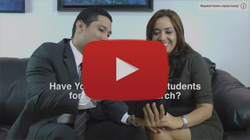 "Below is my email proofreading checklist. Use it as a tool whenever your email contains details that must be correct."
"Below is my email proofreading checklist. Use it as a tool whenever your email contains details that must be correct."
Methods of Teaching Business Communication
Gain unique insights into how to teach your business communication
course more successfully. Read More
Proofreading Checklist to Avoid “Oops!” Messages
Writer’s Tool Kits: Just-in-Time Aids to Effective Writing
 "In my area of specialization, better business writing, I often hear that people are doing a poor job of writing something. Maybe they can’t write good contracts or grant proposals or call reports."
"In my area of specialization, better business writing, I often hear that people are doing a poor job of writing something. Maybe they can’t write good contracts or grant proposals or call reports."
"Well, the interesting thing is that right now I can’t write good contracts, grant proposals, or call reports either, and I teach writing.
"I know how to write well. I would be bored and frustrated if I were sent to more training. No, if writing any of those pieces were one of my key job responsibilities, there would be something lacking in my environment.
"What would be lacking are models and job aids. I don’t have a model contract, grant proposal, etc., to use as an example. Neither do I have any guidelines on how to write them. Nor do I have a series of steps to follow, a checklist, a template, or a resource person to call with questions. What I need is a writer’s tool kit."
Read the full article by Lynn Gaertner-Johnston (photo, left) ...25 Countries Where People Learn Fast, Think on Their Feet, and Accomplish a Lot at Work
 "The World Economic Forum's 2018 global competitiveness report ranks the labor forces of different countries based on skills."
"The World Economic Forum's 2018 global competitiveness report ranks the labor forces of different countries based on skills."
Use These 5 Sales Techniques to Overcome Your Fear of Rejection
 "Make no mistake: Rejection is incredibly painful. In fact, a 2011 study shows that social rejection can mimic physical pain. Here’s what that means for you: Whether you want to ask for a raise, court a new client, or convince another business to partner with you, you must learn how to anticipate this pain without letting it derail your efforts. You must learn to ask confidently. You must manage objections and rejections in a healthy way. Without these skills, you’ll find it difficult to make progress in your life and career," writes Jeb Blount [photo, left] in an article at FastCompany.com.
"Make no mistake: Rejection is incredibly painful. In fact, a 2011 study shows that social rejection can mimic physical pain. Here’s what that means for you: Whether you want to ask for a raise, court a new client, or convince another business to partner with you, you must learn how to anticipate this pain without letting it derail your efforts. You must learn to ask confidently. You must manage objections and rejections in a healthy way. Without these skills, you’ll find it difficult to make progress in your life and career," writes Jeb Blount [photo, left] in an article at FastCompany.com.
"Sales is the one profession where rejection happens on a daily basis. The top salespeople know how to control their emotions, reduce resistance to requests, turn around objections, and–ultimately–skip past nos and get to yes. You, too, can learn to implement these strategies to develop a thick skin. Here’s how."
Read the full article . . .How to Look for a Job While You Are Employed
 "Are job seekers who are currently employed more desirable candidates? Many experts believe so, but you may wonder how to look for a job while you are employed. It can be tricky to conduct your search without arousing your boss's suspicions. She could start looking for your replacement before you are ready to move on. These tips can keep you from running into trouble: . . ."
"Are job seekers who are currently employed more desirable candidates? Many experts believe so, but you may wonder how to look for a job while you are employed. It can be tricky to conduct your search without arousing your boss's suspicions. She could start looking for your replacement before you are ready to move on. These tips can keep you from running into trouble: . . ."
How Artificial Intelligence Is Helping Pearson Refocus Assessment Technology
 "The company's new head of AI and personalized learning sees an opportunity to create enhanced ways of evaluating students' work."
"The company's new head of AI and personalized learning sees an opportunity to create enhanced ways of evaluating students' work."
How to Write Mighty Thank-You Notes
 "Beyond the professional rewards and social approval of writing thank-yous, sending thank-yous makes everyone smile: you, the writer, for having expressed your gratitude, and the recipient for being remembered and appreciated. Thank-yous help people feel valued."
"Beyond the professional rewards and social approval of writing thank-yous, sending thank-yous makes everyone smile: you, the writer, for having expressed your gratitude, and the recipient for being remembered and appreciated. Thank-yous help people feel valued."
"Below are tips to help you write mighty thank-yous that bring smiles to all. If you have others, please share them in the comments."
Read the full article by Lynn Gaertner-Johnston (photo, left) ...The Deadly Customer Service Mistake Your Business Is Probably Making (Without Even Knowing It)
 "The customer service mistake that nearly every business makes, over and over again, is to treat every customer the same. It's understandable that they would fall into this way of doing business, because the alternative-treating every customer as an individual-is more complicated and challenging than pretending that one size fits all."
"The customer service mistake that nearly every business makes, over and over again, is to treat every customer the same. It's understandable that they would fall into this way of doing business, because the alternative-treating every customer as an individual-is more complicated and challenging than pretending that one size fits all."
"Here are just a few of the ways customers are different, and that require you to treat them differently: . . ."
Read the full article by Micah Solomon (photo, left) . . .Finally! The 23 Unwritten Rules of Email
 "It wasn't until I helped my college-aged brother hack (er, set up) his inbox and explained some of the nuances of this ubiquitous method of communication that I realized how many unwritten rules of email have developed over the years."
"It wasn't until I helped my college-aged brother hack (er, set up) his inbox and explained some of the nuances of this ubiquitous method of communication that I realized how many unwritten rules of email have developed over the years."
"Some of them are pretty obvious, but they’re worth repeating (because I still see people breaking them from time to time). And others aren’t immediately intuitive—but, if universally followed, would help us all better send and respond to email.
"So, I’m putting them in writing. Review the list, and repeat after me: 'I do solemnly swear that I will follow the rules of email forevermore.'"
See the 23 rules by Alex Cavoulacos (photo, left), founder of ... Ellen Salzler (photo, left) breaks it down at D2Demand.com.
Ellen Salzler (photo, left) breaks it down at D2Demand.com.


